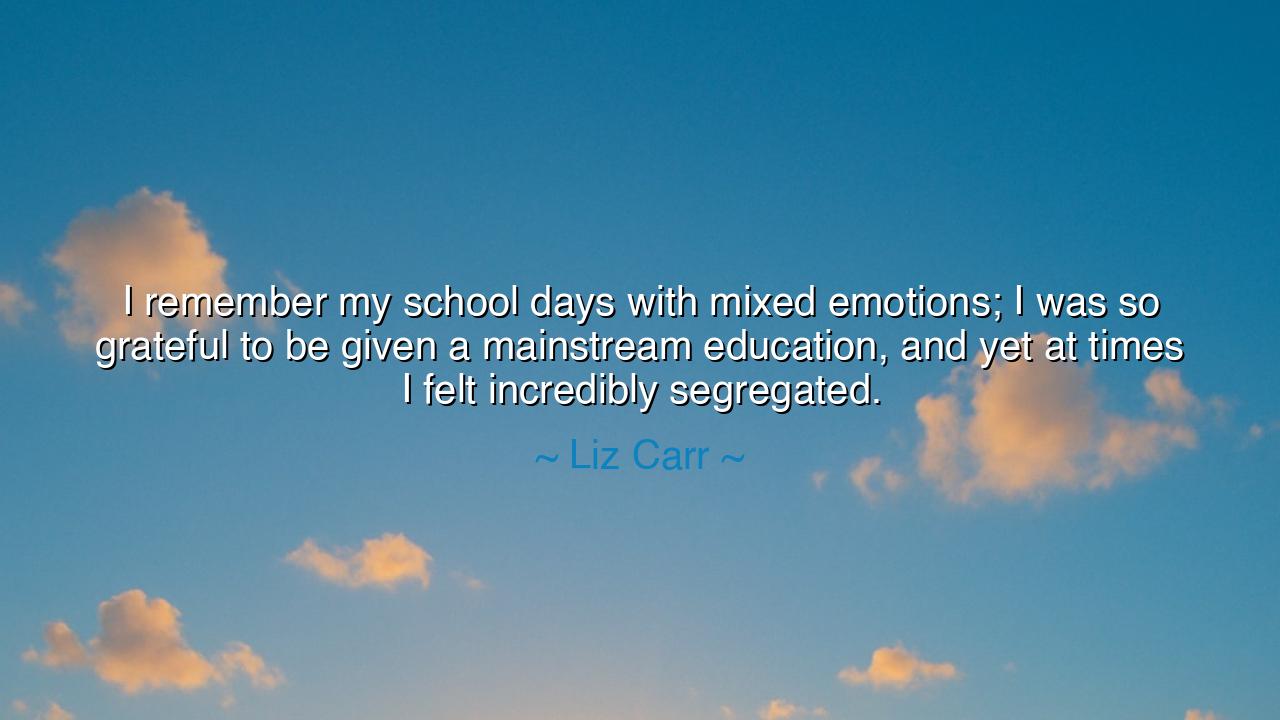
I remember my school days with mixed emotions; I was so grateful
I remember my school days with mixed emotions; I was so grateful to be given a mainstream education, and yet at times I felt incredibly segregated.






Hear the voice of Liz Carr, who reflects with honesty and depth: “I remember my school days with mixed emotions; I was so grateful to be given a mainstream education, and yet at times I felt incredibly segregated.” In her words resounds a paradox felt by many: the joy of inclusion entwined with the sorrow of separation. For she was invited into the halls of learning, yet often reminded that she was different. This tension between gratitude and segregation is not hers alone; it is the story of countless souls who long to belong but are made to stand apart.
The ancients, too, spoke of such struggles. They taught that man is a social being, fashioned for community, yet easily wounded when excluded from its embrace. To be allowed entry into the circle is a blessing; to be treated as an outsider within it is a wound to the spirit. Thus, Carr’s words are not merely personal memory but a mirror held up to society, asking: What good is inclusion if it is hollow? What worth is access if it comes without belonging?
Consider the tale of the great orator Demosthenes, who as a child was mocked for his stammer. Though he studied with the same tutors as others, he was often ridiculed and set apart. Yet he persevered, placing stones in his mouth and shouting against the sea until his voice grew strong. He belonged to the academy, but not to the fellowship of his peers. His struggle reveals the same truth Carr speaks: that education without full acceptance can feel like a double-edged gift—opportunity wrapped in isolation.
Carr’s statement also speaks to the silent burden of those who live with disability or difference. To walk the same corridors as one’s peers and yet feel a gulf that separates the heart is a trial as deep as any. The gratitude for opportunity cannot erase the sting of segregation. This tension is not weakness—it is testimony to the human longing for dignity, for true fellowship, for a place at the table not as a guest, but as one who belongs.
Her words remind us that progress is not only about access, but also about transformation of the heart. A school, a workplace, or a society may open its doors, but unless minds and spirits are changed, the walls of separation remain. True inclusion requires not just permission to enter, but the recognition of equal worth, the celebration of every person’s humanity. Without this, the soul feels as Carr felt: grateful yet lonely, honored yet apart.
The lesson for us is this: gratitude must not blind us to injustice, nor should progress silence the cry for deeper change. We must not stop at offering opportunity; we must labor for belonging. To include someone is not only to share space, but to share respect, friendship, and equal dignity. Let us not settle for a half-finished work, but strive for wholeness in our communities.
Practical steps follow: when you meet those who differ from you, do not merely open the door—welcome them fully. In schools, let every child not only learn together but play together, grow together, and dream together. In workplaces, let inclusion be more than policy; let it be culture. And in daily life, see not the difference first, but the person. In doing so, you build a world where gratitude and belonging are one, where no one remembers their days with the shadow of segregation.
Thus, let the words of Liz Carr echo as both reminder and call: inclusion is not complete until it is whole, and education is not a gift unless it carries dignity. To be grateful and segregated is to live half a truth. Let us labor, therefore, until every child, every soul, may one day say: “I was not only welcomed—I belonged.”






AAdministratorAdministrator
Welcome, honored guests. Please leave a comment, we will respond soon